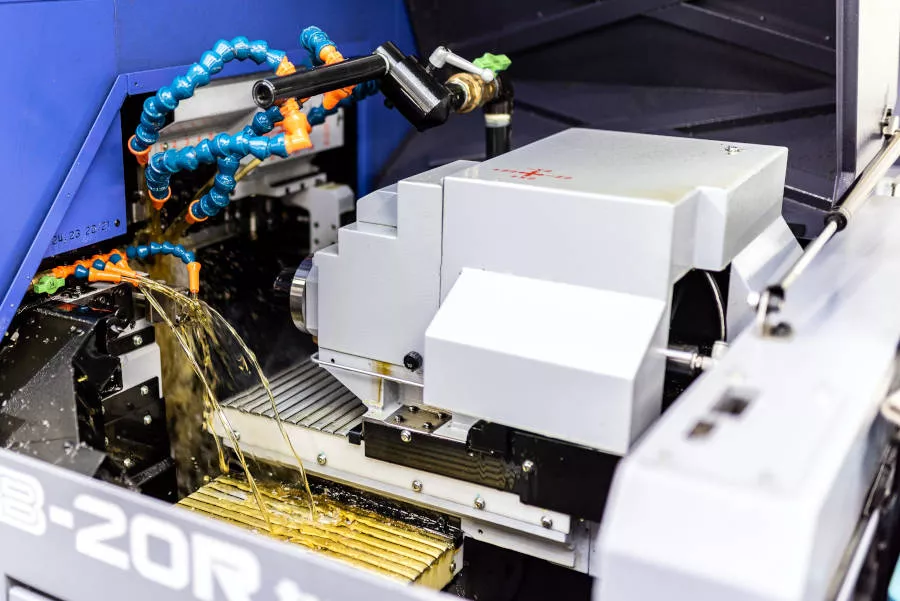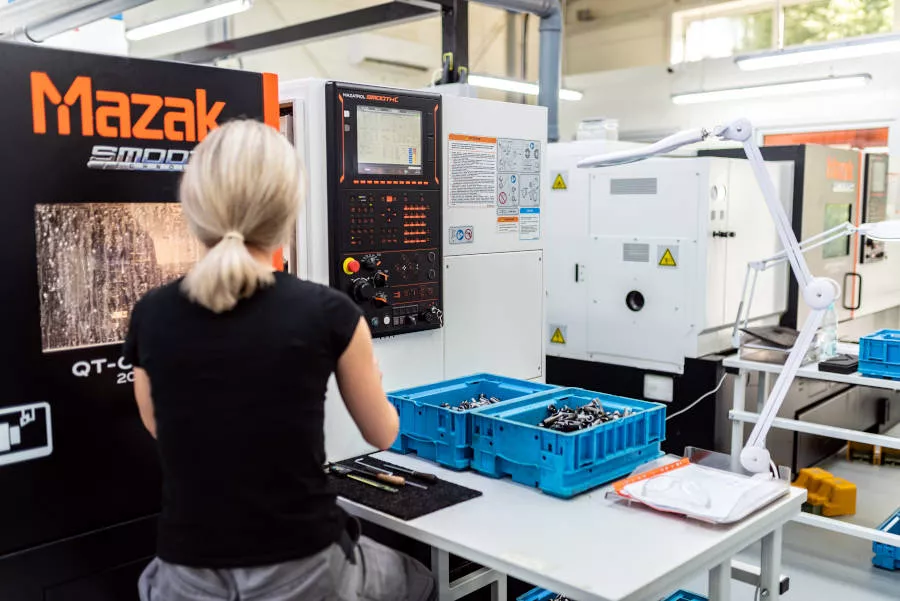CNC Turning - CNC Turning Services
 CNC turning services are the core focus of TOKAR CNC Technology. At TOKAR CNC Technology, we provide technologically advanced solutions in the field of CNC turning, offering services for the production of precise metal components. With years of industry experience, our company is ready to meet the most demanding customer expectations by delivering details with the highest precision and quality.
CNC turning services are the core focus of TOKAR CNC Technology. At TOKAR CNC Technology, we provide technologically advanced solutions in the field of CNC turning, offering services for the production of precise metal components. With years of industry experience, our company is ready to meet the most demanding customer expectations by delivering details with the highest precision and quality.
Why Choose TOKAR CNC Technology?
- Cutting-Edge Technology: We utilize the latest CNC machines, enabling us to achieve exceptional dimensional accuracy and surface smoothness of components.
- Experienced Team of Specialists: Our team consists of experienced CNC turning professionals ready to tackle even the most complex challenges.
- Versatility in Machining: We offer comprehensive CNC turning services, covering various metal materials and a wide range of component shapes.
- Customized Customer Approach: Customer satisfaction is our priority; therefore, we tailor our services to individual needs and project specifications.
Our CNC Turning Services
- Precision Turning: We specialize in turning components with micrometric precision, ensuring compliance with the highest quality standards.
- Prototype Production: We fulfill orders for prototype components, allowing you to test and optimize your design before mass production.
- Small and Medium Batch Production: We are equipped to handle both small and medium batches of components, ensuring efficient production at sustainable costs.
- Complex Projects: Our expertise lies in processing components with intricate geometries, addressing even the most demanding projects.
Trust TOKAR CNC Technology as your partner in the production of precise metal components. Contact us to discuss your needs and receive a customized offer tailored to your project requirements. We are ready to meet any challenge and provide excellent results.
What is Metal Turning?
Metal turning is a mechanical machining process that involves removing material from a workpiece, typically metallic, using a special rotating tool. This process is widely used in the metallurgical and machinery industries for the production of various metal elements such as shafts, bushings, pins, or other cylindrical-shaped details.
During metal turning, the workpiece is placed on a lathe, and the cutting tool is moved around the workpiece, removing excess material. The tool may have various blades, cutters, or other cutting elements, depending on the type of material being processed and the desired shape of the detail.
Metal turning allows for high dimensional precision and surface smoothness of components, which is crucial in the production of machine parts where dimensional tolerances are often very small. Turning is one of the fundamental processes in metal machining and finds application in various industrial sectors.
What is CNC Turning?
CNC Turning (Computer Numerical Control) is a type of turning where the machining process is computer-controlled using a special numerical control system. In contrast to conventional turning, where the operator manually operates the lathe and controls tool movements, CNC turning involves programming and controlling all operations through a computer.
The CNC turning process includes the following steps:
- CNC Program Creation: A programmer creates a specific CNC program containing information about tool movements, rotational speeds, cutting depths, and other processing parameters. This program is typically written in a special CNC programming language.
- Material Loading: The workpiece (e.g., metal shaft) is placed in the CNC machine, and the cutting tool is prepared for operation.
- CNC Program Input: The CNC program is loaded into the machine control system, which then executes the specified operations according to the program.
- Automatic Machining: After inputting the CNC program, the entire turning process proceeds automatically. The computer controls the machine movements, positions the tool, and manages the machining process.
CNC turning offers several advantages, including high precision, repeatability, the ability to handle complex shapes, time efficiency, and the capability to produce large quantities of components with consistent parameters. It is widely used in the manufacturing industry for mass production of precise metal elements.
Precision Turning
Precision turning is a form of turning that focuses on achieving very high dimensional precision and surface quality of machined components. This process is particularly significant in the production of elements where extremely small dimensional tolerances and excellent surface smoothness are required. Precision turning can be applied to process metals, plastics, ceramics, and other materials.
Characteristics of precision turning:
- High Dimensional Precision: Precision turning aims to produce components with very accurate dimensions, typically within micrometer tolerances.
- Surface Smoothness: The process strives to achieve very smooth surfaces on components, eliminating traces of cutting tools and other irregularities.
- Tool Wear Resistance: Precision turning employs special cutting tools with high hardness to minimize wear and maintain high-quality machining.
- Proper Cooling and Lubrication: To protect components from overheating and maintain machining accuracy, suitable cooling and lubrication systems are applied.
Machines used for precision turning include:
- CNC Lathes: Computer-controlled lathes allow precise control of tool movements and achieving very small tolerances.
- Conventional Lathes with Additional Features: Some conventional lathes can be equipped with special cutting tools and cooling systems, enabling precision turning.
- Automatic Multi-Spindle Lathes: These advanced machines allow simultaneous processing of different components, contributing to increased efficiency and precision in the process.
Precision turning is commonly used in the production of watches, medical tools, bearings, precision machine elements, and other components requiring the highest quality and accuracy.
What are Turning Centers?
 Turning centers, also known as multi-function lathes or machining centers, are advanced machines used for multifunctional precision machining of components. These machines combine lathe and milling functions, allowing various machining operations to be performed on a single device. Turning centers are particularly effective in the production of components with complex shapes that require precise machining on different surfaces.
Turning centers, also known as multi-function lathes or machining centers, are advanced machines used for multifunctional precision machining of components. These machines combine lathe and milling functions, allowing various machining operations to be performed on a single device. Turning centers are particularly effective in the production of components with complex shapes that require precise machining on different surfaces.
We primarily operate on turning centers from MAZAK and longitudinal automatics from STAR. Modern machines meet a wide range of production requirements through advanced control systems, and ergonomic machine designs ensure exceptional ease of use.
Key features of turning centers:
- Multifunctionality: Turning centers enable turning, milling, drilling, threading, and other machining operations on a single device, eliminating the need to transfer components between different machines.
- Numerical Control: Most turning centers are equipped with Computer Numerical Control (CNC) systems, allowing for the programming and control of precise tool movements and machine axes.
- Automation: Many turning centers feature automation systems such as tool magazines, tool changers, and measurement systems, enhancing production efficiency.
- Tool Changers: Turning centers may be equipped with tool changers, enabling fast and automatic tool changes during the machining process.
- Processing Complex Shapes: Thanks to various motion axes and the ability to rotate components, turning centers can process components with complex shapes and geometries.
Turning centers are widely used in the manufacturing industry, especially where there is a need to produce precise components in small or medium batches. They are utilized in aerospace, automotive, medical, electronics, and other industries where high precision and comprehensive machining are crucial.